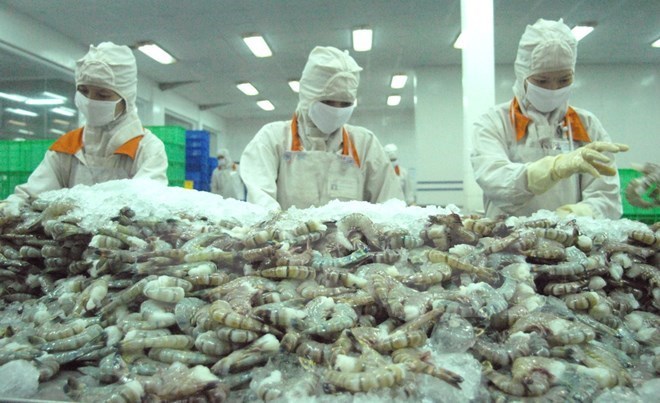
Shrimp processed for exports (Photo: VNA)
The ministry has issued directions to strengthen production of tra fish and brackish-water shrimp during the rest of the year.
The directions aim to take advantage on the global market by maintaining product quality, protecting the brand of Vietnamese tra fish and minimising technical barriers. The ministry asked the authorities of the Cuu Long (Mekong) Delta provinces that farm tra fish to focus on implementing its solutions moving forward.
Local authorities should manage production conditions to ensure the quality of tra fish according to existing regulations. They should encourage businesses to invest in research and production of high-quality tra fish and to farm tra in a value chain for stable production.
The provinces should be certain banned substances are not used in production and processing.
Authorities should encourage businesses to invest in farming brackish-water shrimp and apply advanced technology in production to raise shrimp output and monitor diseases.
The ministry said authorities must continue to supervise purchasing, transporting and processing to stop violations.
Localities should also improve the traceability of tra fish and shrimp according to the regulations. They should continue to develop the market, build their brand and handle export violations.
In the first nine months of this year, Vietnam’s tra fish exports amounted to 1.59 billion USD, an increase of 22.6 percent over the same period last year according to the Vietnam Association of Seafood Exporters and Producers (VASEP).
The association forecasts the figure will reach 2.1 billion USD this year, up 22 percent compared to 2017 – the highest level ever recorded by the sector.
Vietnam earned 369.1 million USD from exporting tra fish to the US in the first nine months of this year, up 42.9 percent. Businesses attributed the surge to stable market demand and higher prices. The Food Safety and Inspection Service (FSIS) under the United States Department of Agriculture has proposed continuing Vietnam’s eligibility to export catfish and other fish products to the US.
The US Federal Register has published a draft of a proposal that would maintain the eligibility of Vietnam, China and Thailand to export catfish and fish products to the US as proposed by FSIS. The US Department of Commerce (DOC) has announced the preliminary results of the 14th period of review (POR 14), between August 1, 2016 and July 31, 2017, and lowered anti-dumping tariffs on tra fish imports from Vietnam to between zero and 2.39 USD per kilogramme from the average rate at 3.78 USD per kg in POR 13. The DOC will announce the final POR 14 results in January 2019.
Vietnam pocketed 376.8 million USD from tra exports to China in the nine-month period, a rise of 30.8 percent against the same period last year. China is now Vietnam’s biggest tra fish importer, making up 23.6 percent of its total tra exports.
Many Vietnamese businesses have seen the ongoing US-China trade war as an opportunity to step up exports to the US. VASEP forecast that the US will surpass China to become Vietnam’s biggest tra importer in the fourth quarter of this year.
Tra exports to other markets like the European Union (EU) and the Association of Southeast Asian Nations (ASEAN) have also increased. As of the end of September, Vietnam’s tra exports to the EU reached 176.4 million USD, up 14.6 percent. The pace is expected to continue until the end of this year. ASEAN is Vietnam’s fourth largest tra fish importer at 145.5 million USD as of September 30, up 44 percent.
The shrimp industry received positive news in the third quarter when the DOC announced anti-dumping tariffs for shrimp in the final result for POR12 was 4.58 percent, much lower than the rate in the preliminary result.
On the domestic market, favourable weather and a recovery in the price of raw shrimp have been important factors in promoting production. In the first nine months of the year, output of shrimp increased eight percent over the same period last year but shrimp export value fell by 1.1 percent to 2.7 billion USD./.
VNS/VNA
 Collective economy—a sustainable direction to escape poverty
Collective economy—a sustainable direction to escape poverty



